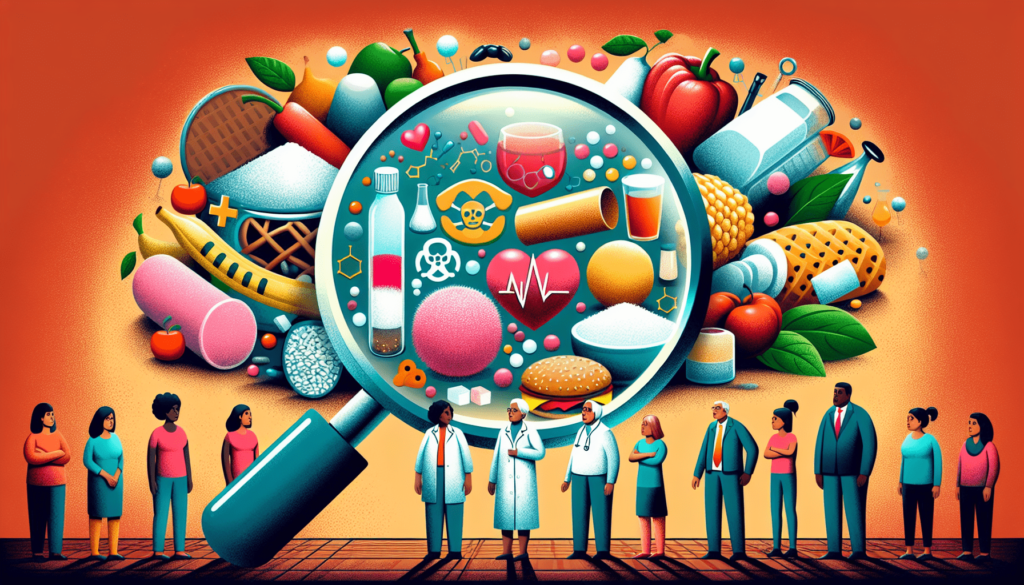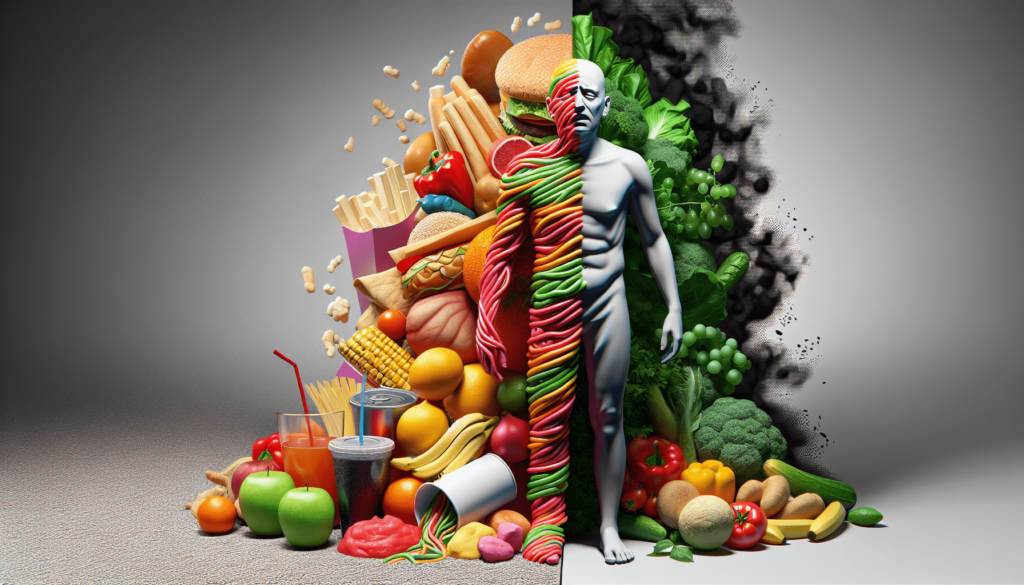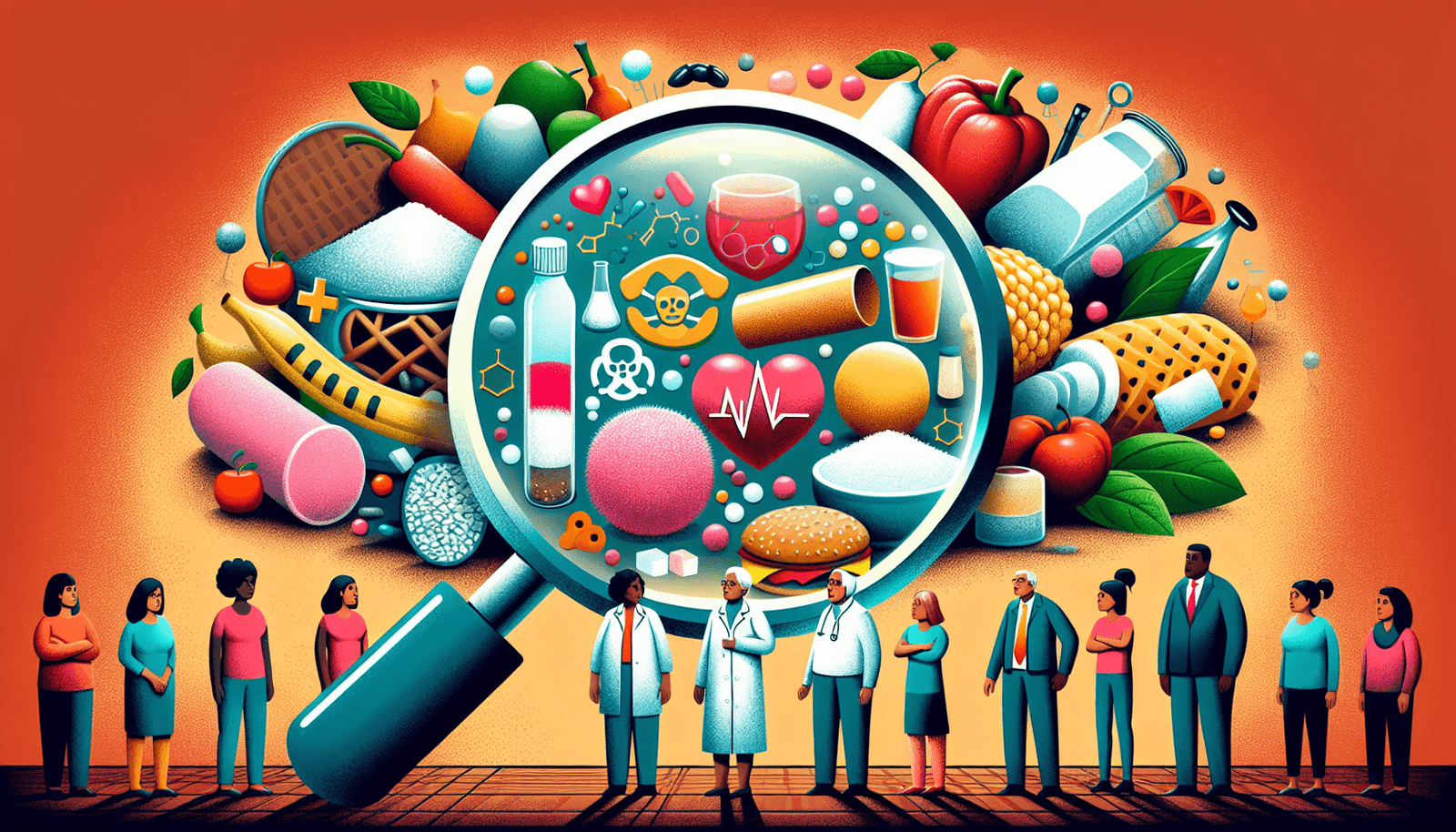Are you curious about the potential risks lurking in the ultra-processed foods we consume daily? Look no further, as this article sheds light on the hidden dangers you need to be aware of. From impacts on your health to the long-term effects on the environment, understanding the risks associated with ultra-processed foods is crucial. So grab a snack and prepare to learn about the hidden dangers that could be hiding in your favorite processed products. It’s time to make more informed choices when it comes to what we put into our bodies.
What are Ultra-Processed Foods?
Definition of ultra-processed foods
Ultra-processed foods refer to food products that are heavily processed and manufactured using numerous artificial ingredients, additives, and preservatives. These foods typically undergo several stages of processing, which often involve the addition of chemical components, such as preservatives, artificial flavors, and colors. Ultra-processed foods tend to be highly convenient and have a longer shelf life compared to fresh, unprocessed foods.
Examples of ultra-processed foods
There are countless examples of ultra-processed foods found in today’s modern food industry. Some common examples include sugary beverages, pre-packaged snacks like chips and cookies, frozen meals, fast food items, and candy bars. Additionally, processed meats, such as hot dogs and sausages, as well as many ready-to-eat breakfast cereals, fall into the category of ultra-processed foods. It is important to note that not all processed foods are considered ultra-processed, as the degree of processing can vary. However, it is crucial to be aware of the potential health risks associated with consuming ultra-processed foods on a regular basis.
Understanding the Health Impact
Effects on weight gain
Consuming ultra-processed foods has been strongly linked to weight gain and obesity. These foods are often high in calories, unhealthy fats, and added sugars, making it easier to exceed daily caloric needs without feeling satiated. Moreover, ultra-processed foods are typically low in fiber, which is essential for promoting feelings of fullness and maintaining a healthy weight. The combination of high caloric content, low nutritional value, and lack of satiety can contribute to overeating and weight gain over time.
Higher risk of chronic diseases
Regular consumption of ultra-processed foods has been associated with a higher risk of developing chronic diseases. These foods are often devoid of essential nutrients and fiber, while containing high levels of unhealthy fats, artificial additives, and refined carbohydrates. Studies have linked the consumption of ultra-processed foods to an increased risk of conditions such as type 2 diabetes, cardiovascular disease, and hypertension. The lack of nutritional value and abundance of detrimental ingredients in these foods can have a detrimental impact on overall health.
Negative impact on heart health
Ultra-processed foods are typically loaded with unhealthy fats, including trans fats, which have been strongly linked to an increased risk of heart disease. These fats are often used to enhance flavor, texture, and shelf life, but they have been shown to raise LDL (bad) cholesterol levels and lower HDL (good) cholesterol levels. Moreover, the high levels of sodium found in many ultra-processed foods can contribute to hypertension and adversely affect heart health. Individuals who frequently consume ultra-processed foods are at a higher risk of developing heart-related issues.
Association with cancer
Several studies have suggested a potential link between the consumption of ultra-processed foods and the development of certain types of cancer. The additives, preservatives, and synthetic ingredients used in the production of these foods have raised concerns among researchers. Some studies have found that individuals who consume a higher proportion of ultra-processed foods have an increased risk of developing certain cancers, including breast, colorectal, and gastric cancers. While more research is needed to establish a definitive causal relationship, the potential association between ultra-processed foods and cancer is a cause for concern.
Effects on mental health
Emerging evidence has indicated that the consumption of ultra-processed foods may have adverse effects on mental health. Studies have shown a link between a diet high in ultra-processed foods and an increased risk of depression, mood disorders, and cognitive decline. It is hypothesized that the lack of beneficial nutrients, the high levels of unhealthy ingredients, and the potential disruption of gut microbiota may play a role in these negative mental health outcomes. Prioritizing a diet rich in whole, unprocessed foods may help support cognitive function and overall mental well-being.

Ingredients and Processing Methods
Use of artificial additives and preservatives
Ultra-processed foods often rely heavily on artificial additives and preservatives to enhance flavor, texture, and prolong shelf life. These additives can include artificial sweeteners, artificial flavors, and various chemical compounds. While these additives are considered safe for consumption in moderate amounts, the excessive and prolonged intake of these substances found in ultra-processed foods has raised concerns. Some individuals may have sensitivities or adverse reactions to certain additives, making it crucial to be mindful of their presence in food products.
High levels of added sugar and unhealthy fats
One of the defining characteristics of most ultra-processed foods is their high sugar and unhealthy fat content. Added sugars, such as corn syrup and sucrose, are prevalent in many processed foods, including sodas, candy, and sweet baked goods. Consuming excessive amounts of added sugar can contribute to weight gain, inflammation, and an increased risk of chronic diseases, including type 2 diabetes. Furthermore, ultra-processed foods often contain unhealthy trans fats and saturated fats, which can raise cholesterol levels and increase the risk of heart disease.
Artificial flavors and colors
To enhance taste and appearance, ultra-processed foods frequently contain artificial flavors and colors. These additives are designed to mimic natural flavors and colors but are artificially created using various chemicals. While the consumption of foods containing artificial flavors and colors is generally recognized as safe, some individuals may experience adverse reactions or sensitivities to these substances. Additionally, there are ongoing debates about the potential long-term health effects of consuming foods with artificial additives.
Processing techniques
Ultra-processed foods undergo extensive processing techniques to create the final product. These techniques often involve a combination of mechanical processes, chemical reactions, and the use of additives. Some common processing methods include extrusion, which is used to create products like breakfast cereals and snack bars, and hydrogenation, which converts liquid oils into solid fats. These methods aim to improve the taste, texture, and shelf life of products, but they can result in the depletion of essential nutrients and the creation of potentially harmful byproducts.
Highly Addictive Nature
Addictive properties of ultra-processed foods
One of the primary concerns surrounding ultra-processed foods is their highly addictive nature. These foods are carefully engineered to be hyper-palatable, meaning they have an intense and pleasurable taste that can trigger cravings and overconsumption. The combination of added sugars, unhealthy fats, salt, and artificial flavors can stimulate the brain’s reward system and create a cycle of craving and consumption. The addictive properties of ultra-processed foods can make it challenging to maintain a balanced and nutritious diet.
Impact on the brain’s reward system
Consuming ultra-processed foods can have a profound impact on the brain’s reward system. Studies have shown that the consumption of foods high in added sugars and unhealthy fats can lead to dopamine release in the brain, which is associated with feelings of pleasure and reward. Over time, this can lead to a conditioned response and reinforce cravings for ultra-processed foods. The constant exposure to highly palatable foods can alter neural pathways and contribute to a cycle of addiction-like behaviors. Breaking free from the grip of ultra-processed foods may require conscious efforts to rewire the brain’s reward system.

Role of Ultra-Processed Foods in the Food Industry
Marketing strategies and appeal to consumers
The food industry utilizes extensive marketing strategies to promote and sell ultra-processed foods. These products are often marketed as convenient, tasty, and affordable options for individuals with busy lifestyles. Eye-catching packaging, celebrity endorsements, and clever advertising tactics further contribute to the appeal of ultra-processed foods. The continuous exposure to these marketing messages can influence consumer choices and perpetuate the demand for these products.
Convenience and affordability
Ultra-processed foods are known for their high level of convenience and affordability. They require minimal preparation time and can be easily obtained from grocery stores, convenience stores, and fast-food chains. The fast-paced nature of modern life, along with the demands of work and family, often leads individuals to opt for quick and convenient meal options. Furthermore, ultra-processed foods are often cheaper than fresh, unprocessed foods, making them a more accessible choice for individuals on a tight budget.
Profit-driven motive
The production and sale of ultra-processed foods are primarily driven by profit. The food industry heavily invests in research and development to create products that are highly addictive and appealing to consumers. Cost-effective manufacturing processes, along with the use of cheap ingredients and additives, contribute to maximizing profit margins. Unfortunately, this profit-driven motive can come at the expense of the health and well-being of consumers.
Negative Effects on Children’s Health
Development of unhealthy eating habits
The consumption of ultra-processed foods in childhood can contribute to the development of unhealthy eating habits. These foods are often designed to be highly palatable and appealing to young taste buds, making it difficult for children to develop a preference for whole, unprocessed foods. Consistently offering children ultra-processed foods can hinder their exposure to nutritious options, potentially leading to a limited diet lacking in essential vitamins, minerals, and fiber.
Impact on growth and development
Healthy growth and development during childhood require adequate nutrition from a variety of nutrient-rich foods. However, ultra-processed foods tend to be energy-dense but nutrient-poor. Excessive consumption of these foods can displace nutrient-dense options and compromise a child’s intake of essential nutrients. This can have implications for physical growth, cognitive development, and overall well-being during childhood and beyond.
Increased risk of childhood obesity
The rise in childhood obesity is closely associated with the consumption of ultra-processed foods. These foods, often high in calories, added sugars, and unhealthy fats, can contribute to excessive weight gain in children. Childhood obesity not only increases the risk of developing chronic diseases at an early age but also has significant physical, emotional, and social consequences. It is crucial to prioritize the consumption of whole, unprocessed foods in children’s diets to foster long-term health and well-being.
Regulation and Labeling
Lack of clear labeling
One of the challenges in addressing the issue of ultra-processed foods is the lack of clear labeling. Current food labeling regulations may not adequately differentiate between minimally processed foods and ultra-processed foods, making it difficult for consumers to make informed choices. Many ultra-processed foods are marketed using health claims or misleading descriptors, further adding to the confusion. Improved labeling regulations that clearly identify the degree of processing and the presence of artificial additives are necessary to empower consumers to make healthier food choices.
Importance of improved regulation
The regulation of ultra-processed foods is crucial in protecting consumer health and well-being. Stricter regulations can help reduce the presence of harmful ingredients, improve labeling practices, and promote the production and consumption of healthier alternatives. Governments, regulatory bodies, and the food industry must work together to implement and enforce policies that support the production and availability of nutritious, minimally processed foods. Additionally, public health campaigns and education programs can help raise awareness about the risks associated with ultra-processed foods and empower individuals to make healthier dietary choices.
Tips for Minimizing Consumption
Focus on whole, unprocessed foods
One of the most effective ways to minimize the consumption of ultra-processed foods is to prioritize whole, unprocessed foods in your diet. Fresh fruits and vegetables, whole grains, lean proteins, and legumes should form the foundation of a nutritious eating plan. These foods are rich in essential nutrients, fiber, and antioxidants, and can help support optimal health and well-being. By focusing on whole foods, you can reduce your reliance on ultra-processed alternatives.
Read food labels
When purchasing packaged foods, it is essential to read food labels carefully. Look for ingredients lists that are minimal and recognizable as real food. Avoid products that contain added sugars, unhealthy fats, and artificial additives. Pay attention to portion sizes and the nutritional content of the food. Familiarize yourself with the different names for added sugars and be cautious of products that have lengthy, complex ingredient lists.
Prepare meals at home
Cooking meals at home gives you greater control over the ingredients and cooking methods. By preparing your own meals, you can choose to use fresh, unprocessed ingredients and limit the use of additives, unhealthy fats, and excessive sodium. Plan your meals in advance, experiment with new recipes, and involve your family in the cooking process. This can not only help reduce your consumption of ultra-processed foods but also promote healthier eating habits for the whole family.
Limit eating out or ordering takeout
Frequent dining out or ordering takeout can significantly contribute to the consumption of ultra-processed foods. Restaurants and fast-food establishments often rely on processed ingredients and unhealthy cooking methods to meet demands for quick and convenient meals. Limiting the frequency of eating out can help reduce your exposure to these foods. Instead, opt for home-cooked meals or choose restaurants that prioritize whole, unprocessed ingredients and offer healthier options.
Advocacy for Change
Promoting awareness about ultra-processed foods
Raising awareness about the dangers of ultra-processed foods is essential in promoting healthier eating habits and driving change in the food industry. Educational campaigns, media initiatives, and community outreach programs can help inform individuals about the risks associated with excessive consumption of ultra-processed foods. By empowering people with knowledge and encouraging them to make informed food choices, we can promote a shift toward a healthier food environment.
Supporting policies for healthier food options
Advocacy for policies that prioritize the production and availability of healthier food options is crucial. This includes supporting initiatives that promote the consumption of whole, unprocessed foods in schools, workplaces, and public spaces. Moreover, advocating for stricter regulations on food labeling, marketing practices, and the use of artificial additives can help protect consumer health and promote a more transparent food industry. By advocating for change at both individual and systemic levels, we can foster a food environment that supports the health and well-being of all.
Conclusion
Ultra-processed foods have become omnipresent in our modern food environment, contributing to various health risks and challenges. Their high levels of artificial additives, added sugars, and unhealthy fats, combined with their highly addictive nature, make them a concerning component of our diets. The detrimental impact of ultra-processed foods on our weight, chronic disease risk, heart health, mental well-being, and children’s health cannot be ignored.
To minimize the consumption of ultra-processed foods, it is important to prioritize whole, unprocessed foods, read food labels carefully, and prepare meals at home. Limiting eating out or ordering takeout can also help reduce the intake of these foods. Advocacy for change, including promoting awareness about the dangers of ultra-processed foods and supporting policies for healthier food options, is crucial in shaping a food environment that prioritizes consumer health.
By making conscious choices and advocating for change, we can take control of our diets and work towards a healthier future. Remember, it’s never too late to make positive changes for your health.

